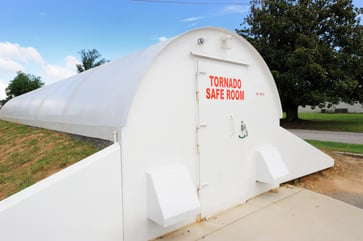TORNADOES 101: What is a tornado, and how can your business better prepare for one?
Tornadoes are considered one of the most violent natural disasters. Learn how they form, and how you can protect your property, people, and assets with AccuWeather.
>>Learn more about AccuWeather For Business

Recently, deadly tornadoes ripped through the South, destroying local businesses and causing logistical and supply chain disruptions across the country. Learn more about how they form, and how can you better protect your property, people, and assets.
In March 2023, dozens of tornadoes ripped through communities in several states across the South, devastating businesses and communities. In Alabama and Mississippi, nearly two dozen people died. Trucks and cars piled up on highways, and the twisters obliterated businesses and homes.
On average, organizations that use AccuWeather SkyGuardâ Warnings receive an average of 16 minutes of advance notice compared to 8 minutes from all other sources. The extra time allows businesses to execute their emergency plans and seek shelter before a tornado hits their facility. It’s proven that these businesses are better prepared and employees are safer.
What is a tornado?
A tornado is a violently rotating column of air that touches the ground from a thunderstorm. A tornado funnel is visible because of all the water droplets, dust, and debris. Tornadoes are considered one of the most violent storms in nature.
What causes a tornado to happen?
A tornado forms from a large thunderstorm when warm, humid air rises and cool air falls. These conditions can cause air to spin inside the cloud. They start horizontally but then drop vertically to the ground.
Where do tornadoes happen?
Tornadoes can happen anywhere but are most common in the U.S. Roughly 1,200 tornadoes touch down in the U.S. each year. Many of these tornadoes occur in “tornado alley,” a vast area in the central U.S. with a high occurrence of tornadoes. Tornado threats can shift from the Southeast in the cooler months to the Plains in May and June and the northern Plains and Midwest in the summer.
When do tornadoes happen?
Tornadoes can happen any time of year. Tornadoes can happen any time during the day or night, but most occur between 4-9 p.m. Tornadoes that happen at night are the most dangerous.
What to do during a tornado?

When a tornado strikes, your business must prepare better to protect your people, property, and assets.AccuWeather For Business can help you do that. Here are a few actions you can take:
• Follow up with your AccuWeather For Business meteorologist for one-on-one consultations to stay current about tornadoes moving through
• Follow your company or organization's tornado drill and move to your shelter location. Stay away from windows and large open rooms such as cafeterias
• Outside workers should look for a sturdy building to seek shelter in immediately. Sheds and storage facilities are not safe
• If you are in a work vehicle, staying inside is also unsafe. Drive to the closest shelter or sturdy building. If nothing is around, abandon your car and seek shelter in a low-lying area like a ditch
>>READ MORE: When minutes matter: how to plan for and respond to a SkyGuard Tornado Warning
Superior Accuracy™: Better informed, Better protected, Better prepared.
Be proactive with AccuWeather SkyGuard Warnings backed by Superior Accuracy™, which will deliver site-specific alerts and warnings well before severe weather hits, giving you much-needed time to prepare.
Benefits of SkyGuard® Warnings:
• Proactive, site-specific alerts offer warnings well before severe weather impacts occur
• Live one-on-one or group consultation is provided by our weather experts anytime, day or night
• Reviewed Tornado Notifications: we monitor your pinpoint location and alert you when a tornado isn't threatening your assets
• Alerts delivered in a format that aligns with your organizational emergency management plan
• All-clear notifications are sent when a threat is over, minimizing weather-related downtime
• All alerts are delivered via push notification from the SkyGuard mobile app, available on Android and iOS















